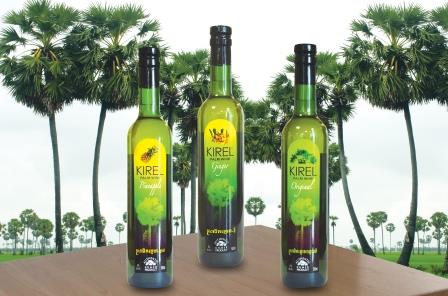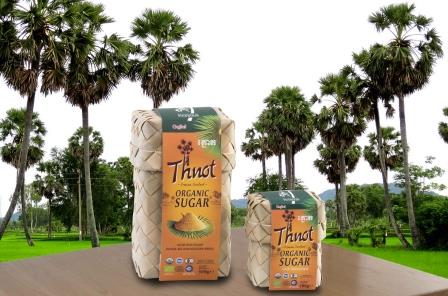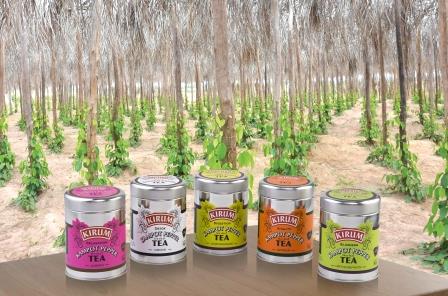CONFIREL is associated with food and beverage made from the sugar palm tree, having produced from this “symbol of poverty” such products as candy, vinegar, and wine. Besides these, the company offers dietary food with Noni juice, and the newly launched Kampot pepper tea.
In this interview, founder and president Dr Hay Ly Eang explains how Confirel’s countryside development is stimulating economic growth in Cambodia and driving sales in international markets.

What was your main motivation in creating Confirel in 2001?
Upon coming back to Cambodia in 1992, I wanted to help rebuild my country so I thought of implementing two health-related projects. One was through pharmaceutical products manufacturing and the other was through Confirel’s development project to fight poverty. I started the pharmaceutical products with concepts from brand image to communication to technology to raw materials – all brought in from overseas. Confirel, on the other hand, was launched as a 100% Cambodian project at all levels: human resource, know-how, soil, farmers, technology and raw materials. I envisioned that succeeding in these two radically opposed projects would prove to the Cambodian people and the rest of the world that Cambodia can recover and rise above its challenging past.
Did you produce sugar only when you first started or did you produce wine and spirits along with it?
Choosing the sugar palm tree (Thnot) as the first product for Confirel’s range was really symbolic. The sugar palm tree is the national symbol of Cambodia. It is the tree of the King as well as the poor people. Showing that this symbol of poverty could be developed more and made economically profitable was quite an audacious, almost impossible, bet.
So yes, Confirel’s Thnot (sugar palm) product range started with the sugar itself, which is the main product output of this palm tree species and has been traditionally produced in Cambodia for centuries. Unfortunately, it cannot compete with cane or beetroot sugars in term of costs. We had to make a differentiation in the market between this sugar and the others based on its nutritional value so we positioned it as a premium sugar, thanks to its numerous health benefits. Our efforts paid off with the Organic certification of the sugar by Ecocert as well as winning the “Médaille d’Or” (Gold Award) at the Natexpo Exhibition in Paris in 2005.
The strategy was to remind people about the value of the sugar palm tree through palm sugar. However, the main opportunities for the sugar palm tree still lay in developing value-added products that conserve energy sources and minimize the effect on the environment. We were able to achieve this through innovative products such as palm wines, palm vinegars, palm spirit and other products using palm sap processing.

Confirel offers palm wine in various flavors
What is organic sugar’s edge over other sugar sources?
The scientific name of the sugar palm tree is Borassus Flabellifer, known for its male and female flowers, which provide very specific flavors. In the Materia Medica, the sugar palm tree is classified as an excipient and good source of energy, which can be used for various medicines. Of course these natural properties can be found in the palm sugar, which has a delicious taste, a low glycemic index that is ideal for diabetics as well as a high content in fructose, vitamins, trace elements and more importantly polyphenols, which protect our cells.

Premium unrefined palm sugar
Despite its vast potential, the palm sugar industry remains small in Cambodia. What do you consider are its main challenges?
The sugar palm will never become an industrial product due to the technical and natural constraints of collecting it. Harvesting necessitates climbing a palm tree that can rise 30 meters from the ground so palm sugar is not for mass production. However, it is a rare and exceptional product that remains a symbol and a driving force for many rural development projects around the world. It is a potential premium product for nutrition and health, and will contribute to having other traditional products recognized internationally. Developing other products utilizing its sap or activities related to its use offers great prospects including diversified agriculture, ecotourism or cultural tourism.
What is the company’s current production capacity?
We are targeting 70 tons of Organic Thnot Sugar this year and hope to more than double it to 150 tons by 2016. From 10 tons of PGI (Protected Geographical Indication) Kampong Speu Sugar in 2015, we likewise hope to increase it by 50% to 15 tons in 2016.
There are about 3 million sugar palm trees in Cambodia but only a small percentage of it is currently being utilized. Every year, we increase the number of trees to be harvested and work with more farmers who harvest from selected trees growing on their land. We are also making improvements in our production processes including drying to further improve the quality of the sugar and extend its shelf life.
Most palm sugar producers in Cambodia sell locally like you but you managed to expand overseas. What markets are you in and what steps did you take to market overseas?
At first, Confirel was the only company interested in palm sugar, but our success has attracted competitors. Ultimately, it helps promote the products. We are where demand is: in France and other countries in Europe, the US, Canada, China, Japan, South Korea, Malaysia, Taiwan, Morocco, etc. Confirel’s products are positioned to appeal to global clients, and that is why our products sell well abroad. We likewise focus on meeting all international standards so we do not face any restrictions in accessing foreign markets. To more efficiently promote our products, we also attend international exhibitions according to our budget.
Having your sugar awarded Geographic Indicator puts it on the shortlist of high-quality goods. On top of this though, how do you ascertain the quality your products?
That’s correct. Our products are certified organic and PGI (Protect Geographical Indication) by Ecocert International, a worldwide certification organization that conducts regular audits at our premises as well as in the fields.
We also have been working as per the GMP standards, certified by TUV. Our palm sugar, specifically is certified Halal by the Muslim Association and fair trade by Ecocert.
What other palm sugar-based products is Confirel currently producing?
At the moment our Thnot sugar product range includes the Kampong Speu Organic Sugar, the PGI Kampong Speu Thnot sugar and a range of Thnot candies available in original, coco, mango, pineapple, Kampot pepper, durian and banana flavors.

What to do with Kampot pepper inflorescences? They make good tea, a new product from Confirel
Pepper is generally used as a seasoning, but you have gone a step further and even developed it into tea drink.
We became interested in the Kampot Pepper as it is a unique product in the world. Considered the “King of Peppers”, it is the one that Genghis Khan and Kublai Khan sought for and is now produced under the PGI Kampot Pepper. This product fits perfectly with our vision of creating the new Kirum “condiment-oriented” product range alongside the existing Thnot and drinks. Our R&D team is composed of talented people, engineers who are devoted to their task and to our developmental vision. We also regularly cooperate with foreign staff on more specific tasks through internships or consulting services.
We have R&D partnerships with the French development NGO GRET, Instituts Universitaires de Technologie in France, the Pasteur Institute in Phnom Penh, the Can Tho University in Vietnam as well as the CIRAD of Montpellier (France), helping us develop equipment prototypes to meet with specific production requirements.
The development of our Pepper Tea came about as I was harvesting last year. Noticing the mature pepper inflorescences that fell on the ground made me curious if they could be used for something else. I researched on studies done on it and ran various tests with my production director. Earlier this year, we launched our Kirum Kampot Pepper Tea range in Original Pepper, Jasmine, Lemongrass, Ginger and Orthosiphon flavors in the local market. We are expanding overseas soon through our existing business partners.
Could you tell us more about the products under your KEM brand?
KEM is the new range of Healthy Complementary Food (dietary food) products of Confirel that uses fermented Noni juice (Morinda citrifolia). Its natural fermentation in the seaside area of Kampot in Cambodia gives it a strong concentration of probiotics. KEM, with its core properties, helps fight stomach ulcers, stimulates the immune system and aids in the regeneration of body tissues.
What else is in the pipeline for Confirel and how do you hope to achieve them?
We are ready to launch 32 new products. We are just waiting for the current range to further increase its market share before we do so. I do not really go around looking for new products to develop. They often come to mind according to specific circumstances and only require little R&D before being finalized. So far consumers validate their reason for being.
New Arrivals
 iConnectHub
iConnectHub
 Login/Register
Login/Register Supplier Login
Supplier Login



























